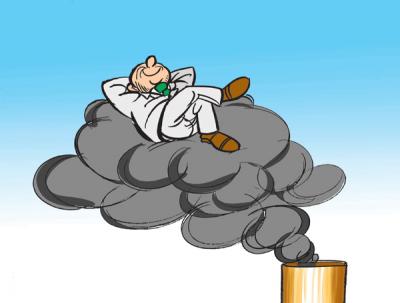Few countries are at greater risk from man-made climate change than Mauritius. The Maldives may be more dependent on their beaches and Bangladesh on its agricultural land, but can we afford to lose either? Low lying countries and island states are quite rightly joining their voices this week at Rio+20 to call for global agreements to cut greenhouse gas emissions. So why is our government undermining the cause by repeatedly declaring its commitment to coal?
The wrong reasons
There seem to be two arguments. First, because Mauritius is such a small country, our emissions are insignificant compared with the major polluters; therefore, we can do what we like – it is up to the larger countries to change. While true on a national level, it is less so on a per capita basis. Why would a citizen of the US feel compelled to reduce his carbon footprint if a Mauritian is determined to increase his? Previous UN conferences addressing climate change have revealed the reluctance of countries to act. Our own hypocrisy provides them with the perfect excuse.
The second argument appears to be technical – it is simply not possible for Mauritius to meet its needs sustainably. Paraphrasing one minister’s recent metaphor of a bed: renewable energies can be the sheets and duvet, but the mattress must be coal. Do we really have no other options or are our decision-makers asleep to the possibilities?
Self-fulfilling prophecy
The amount of sunshine falling on Mauritius, if captured by standard photovoltaic panels, is enough to satisfy our electricity demands 200 times over. Our wind resource, though less abundant, could also make a significant contribution if turbines were installed at all suitable sites. However, while ample on an annual basis, these sources are constantly fluctuating and hence do not match our needs second-by-second. When electricity storage becomes cheap enough, this problem will be solved, until then, the amount we can utilise is limited.
When the proportion of variable renewable energies is small, they are lost in the noise of our own fluctuating demand. As more are added, flexible sources of generation are needed to make room for them when they are producing electricity and make up for them when they are not. The critical factor is how rapidly these changes occur and this is the Achilles’ heel of coal-fired power stations. Their slow responsiveness, especially compared with gas or diesel alternatives, means that coal is incompatible with anything more than a green-wash of wind and solar power. If we choose coal now, we will have to live with the consequences for the life-time of the power stations – up to thirty years.
Green gas and diesel
There are estimated to be 14,000 hectares of abandoned sugarcane fields. Less than half of this is enough to produce 100MW of flexible electricity in small distributed units. This would meet the urgent need for greater capacity without turning to coal. The key is to grow a high yield energy crop like Giant King Grass and then upgrade it into a more useful fuel. There are two attractive options:
* Cut the grass every 1-2 months and allow microbes to convert it into gas. Known as anaerobic digestion, this is a natural process that decomposes organic matter into methane and carbon dioxide in the absence of oxygen. It takes place in landfills but is more efficient under controlled conditions. One advantage is that the residue is an excellent fertiliser, one disadvantage is that the process can take several weeks. Gas engines, like the ones recently installed at Mare Chicose, are readily available.
* Cut the grass at full height, dry it and then convert it into synthetic diesel. The recently developed “KDV” process uses catalytic depolymerisation at normal pressure and temperatures less than 400ºC to “crack” long hydrocarbon molecules into shorter ones. This combines the geological processes that created crude oil with those of a refinery. It is much quicker than anaerobic digestion but requires more input energy and produces no useful fertiliser. However, it captures harmful materials like heavy metals and halogens.
The two processes can also produce useful fuels from well-segregated organic waste and even paper and plastics in the case of KDV. Synthetic diesel can be used instead of heavy fuel oil in the CEB’s power stations as well as in tractors, lorries and buses. Ideally, small vehicles should be electric so that they can utilise wind and solar electricity, especially if smart charging is introduced. By extending grass cultivation to more land, and provided we don’t neglect efficiency, we have the means to be self-sufficient in domestic energy use. The question is: do we have the will?
Dethrone the Despot: Old King Coal
- Publicité -
EN CONTINU ↻


